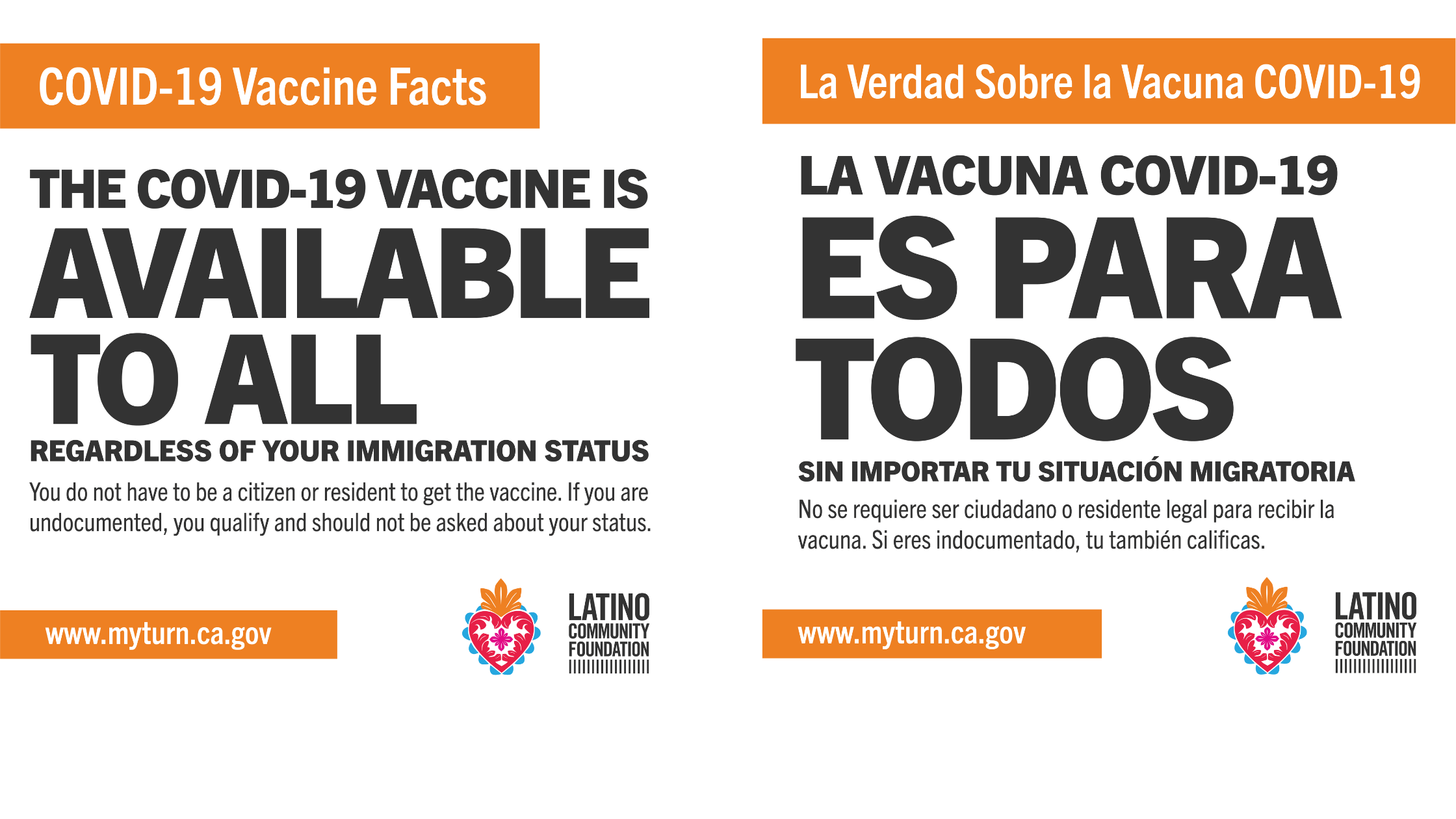“You’ve earned the right to ask the questions you have around these vaccines and this vaccine development process. Trust-especially when it has been stripped from people- has to be rebuilt in a brick-by-brick fashion.”
– Dr. Kizzmekia Corbett, Coronavirus Vaccines & Immunopathogenesis Team at the National Institutes of Health
There is a light at the end of the COVID-19 tunnel now that several vaccines have been approved and administered to millions across the country.
However, vaccine hesitancy is still a challenge. For example, despite incidences of severe illness from the virus disproportionately affecting Latinos, many have indicated they are less likely to receive the vaccine.
We are currently living in what the World Health Organization has coined an ‘infodemic,’ with a litany of information making it difficult to distinguish between what is trustworthy, and what is hearsay. The internet is a useful resource for finding and sharing important information in any language, but it is largely unregulated, making it a breeding ground for misguided claims. This has been especially true since the pandemic was declared, contributing to widespread confusion and mistrust in public health authorities.
Even in early trial stages, an abundance of content calling into question the safety and efficacy of the vaccine had started making rounds in the media and online. A large volume of videos, photos and headlines are circulating on social media platforms across the internet, depicting false claims of adverse events, exaggerated allusions to ulterior motives, or ties to certain political groups.
an ‘infodemic’ of false information
This has amounted to a surge in hesitancy, misperception, and disengagement, ultimately posing a challenge to achieving herd immunity and protecting against severe illness. Blunting this information as soon as it appears is essential to reducing harm and driving vaccine uptake.
understanding mis/disinformation
Misinformation results from source information becoming distorted due to misunderstanding, fear, and subsequently miscommunication. For example, source information which is poorly translated into a different language culminates in key concepts being misinterpreted, taken out of context, or completely lost, straying further from its original message. This is an easy trap to fall into, especially with evolving COVID-specific terminology that does not yet have equivalent translations in every language. Misinformation can also play on people’s valid concerns, religious, political, and cultural beliefs, or prejudices, creating a moral quandary against getting vaccinated.
This is a common occurrence among Limited English Proficient (LEP) communities that are consuming and sharing content that has been improperly translated or maladapted for the target audience. While it may originally have been a minor error or farce, either about an adverse event, statistic, or a drug name, it can rapidly escalate into a much bigger issue and take on a whole new meaning.


tackling misinformation
Cracking down on misinformation begins with identifying the source. A lot of people are more likely to trust a close friend or family member delivering key updates about the vaccine, especially in collectivist cultures. Once it begins to spread, it can be tricky to track since it tends to happen on encrypted platforms, such as WhatsApp. Furthermore, a great deal of misinformation is coming from outside the U.S., such as Latin American countries. Once it lands in the hands of trusted messengers, it begins to pick up momentum and can quickly become viral.
Here are some effective measures to help stop the spread of misinformation in vulnerable communities:
Leveraging trusted groups and influencers, such as civil rights organizations, that are accustomed to working at the grass-roots level
One study on COVID-19 messaging found that inaccurate claims made by politicians, celebrities and social media personalities accounted for just 20% of overall communication, but racked up 69% of total engagement. Credible public health institutions can counter the immense volumes of misinformation by partnering with prominent community influencers to share accurate information.
Trusted organizations, such as Get Out the Vote, are experienced in identifying misinformation targeting specific groups, and work to deliver unbiased, multilingual resources that focus on fact rather than fear. By working with groups who understand community concerns at a grass-roots level, it is easier to dispel harmful rumors about the vaccine.


Reporting and de-platforming misinformation through social saturation
Sharing misinformation in any context, including to highlight myths, is still giving it a platform to perpetuated. Instead of sharing incorrect information, engage others to identify it, report it immediately, and actively respond with credible information. Continuous exposure to correct statistics, data and evidence can help to marginalize or even eliminate false claims.
For individuals who are vulnerable of receiving and sharing misinformation, encourage them to be vigilant and refer to credible health authorities, such as the CDC or the World Health Organization for important vaccine updates and resources.
Engaging with and validating those who have questions or concerns
The concerns of communities of color, LEP communities, and vulnerable groups should be listened to. History of medical experimentation and discrimination has left a legacy of distrust against government and healthcare systems. A study by the Kaiser Family Foundation found that 43% of Black Americans wanted to ‘wait and see’ before receiving a vaccine, compared with 26% of white Americans. This is considered to be a direct consequence of negative experiences within the medical system at large.
Before polarizing these individuals by branding them ‘anti-vaxxers,’ take time to address their questions with empathy, and consider the historical context of their mistrust. Remember, this is a daunting period in history, and concerns are to be expected.



Making the information digestible in any language
There is already evidence that LEP communities are being left behind in vaccine messaging strategies. Heavy use of medical jargon and scientific terminology, alongside complicated charts and studies, can bog down useful materials regarding the COVID-19 vaccine. Instead, leverage powerful, linguistically accessible messaging strategies and visuals to engage and educate in a way that will resonate.
For example, the Better For It campaign run by the Center for Black Health & Equity has created a science-based guide that is easy and enjoyable to read and digest. It also addresses important cultural nuances to kick-start conversations about how to make informed choices about the COVID-19 vaccine.
Bespoke cultural adaptation of messaging about vaccines is often as important as language translation. Delving deeper into cultural influences behind vaccine hesitancy helps to bridge gaps in disconnects that are often prevalent in medical settings.
For example, a collectivist culture that values family and community above all else might feel better about receiving the vaccine if they see it as an opportunity to protect their loved ones from becoming severely ill.
Separately, those who are undocumented may be uncomfortable with sharing their information, or may not have access to insurance and believe they cannot afford the vaccine. The federal government has provided resources to ensure that insurance coverage and immigration status are not eligibility requirements. However, these individuals want a clear answer from physicians and politicians as to whether or not receiving the vaccine will place them in a precarious position.
Furthermore, for communities whose language and culture are at risk, the vaccine plays a meaningful role in promoting its preservation. Emphasizing this has been shown to promote uptake in Cherokee communities across the U.S.
By tapping into these relevant cultural values and concerns, we forge meaningful connections and build trust, with positive implications for our individual health, and in the collective fight against COVID-19.

Resources for Education & Combatting Vaccine Hesitancy:
- World Health Organization
- Centers for Disease Control
- Kaiser Family Foundation
- National Institutes of Health
- S. Department of Health & Human Services
- The Food & Drug Administration
- American Academy of Pediatrics
Help to mitigate the spread. Reporting problematic content is a civic responsibility! If you notice any misinformation related to the COVID-19 vaccine, please report it here.

empowering people to make the best decisions about their health
By making sure that information is accessible, relatable, and adapted to language, values and culture. In this unprecedented era of innovation and healthcare advances, we can help you connect with the people you work to serve, to ensure nobody gets left behind. Leverage your cultural intelligence to empower your audiences today.
